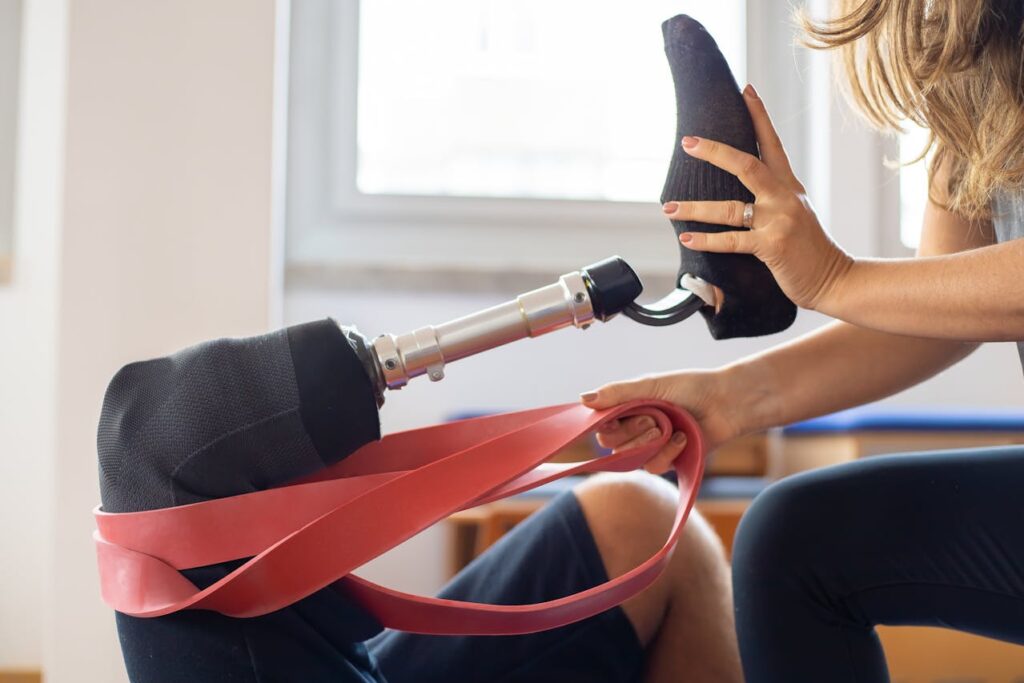When a child starts using a prosthetic limb, learning how to move comfortably and confidently takes time. Whether they are using a prosthetic leg for walking and running or a prosthetic arm for gripping and lifting, regular training and exercises can help them build strength, balance, and coordination.
With the right exercises, children can improve mobility, prevent discomfort, and feel more in control of their movements. Training doesn’t have to be boring or difficult—making it fun and engaging helps children stay motivated and see their prosthetic limb as a natural part of their body.
In this guide, we’ll explore practical exercises that can help children develop better mobility, posture, and confidence while using their prosthetic limb.
Strengthening Core Muscles for Better Stability
A strong core helps maintain balance, posture, and smooth movement. For children with leg prosthetics, core muscles keep them steady while walking, running, or standing. For those with arm prosthetics, a strong core provides better support when lifting or holding objects.
Why Core Strength is Important for Prosthetic Users
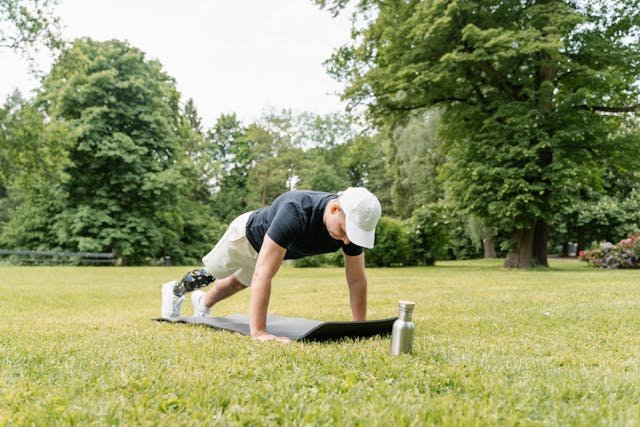
Without good core strength, children may experience poor posture, difficulty balancing, or excessive strain on other muscles. Strengthening the core helps prevent these issues and makes movement more natural and effortless.
Simple Core Exercises for Kids
One of the best ways to strengthen the core is through playful and engaging exercises. Activities like seated balance games, mini yoga poses, and fun obstacle courses can make core training enjoyable.
For a beginner core workout, children can try:
- Seated Ball Rolls: Sitting on the floor with their legs crossed, they can roll a ball in a circle around their body, engaging their core muscles.
- Animal Walks: Moving like a bear, crab, or frog helps activate core muscles while improving body control.
- Side-to-Side Reaches: Sitting with legs extended, they can reach side to side to improve flexibility and strengthen their oblique muscles.
Practicing these exercises daily will increase stability and make movements smoother, improving their ability to use their prosthetic limb efficiently.
Building Strength Through Fun Activities
Children love interactive games, and incorporating core exercises into everyday play makes training feel like a natural part of their routine. Activities like climbing playground equipment, dancing, or simple stretching games can strengthen the core without feeling like a workout.
Parents and therapists can encourage kids to engage in active play that promotes movement, ensuring they develop the core strength needed to use their prosthetic limb with confidence.
Improving Balance and Coordination
Balance is essential for walking, running, and standing confidently. A child with a leg prosthetic must learn how to distribute their weight properly, while a child with an arm prosthetic must adjust to movements that may feel different from before.
The Role of Balance in Using a Prosthetic Limb
Good balance prevents falls, improves posture, and makes everyday activities easier. Training the body to stay steady helps children feel more in control of their movements, reducing frustration and increasing independence.
Balance Exercises for Kids with Leg Prosthetics
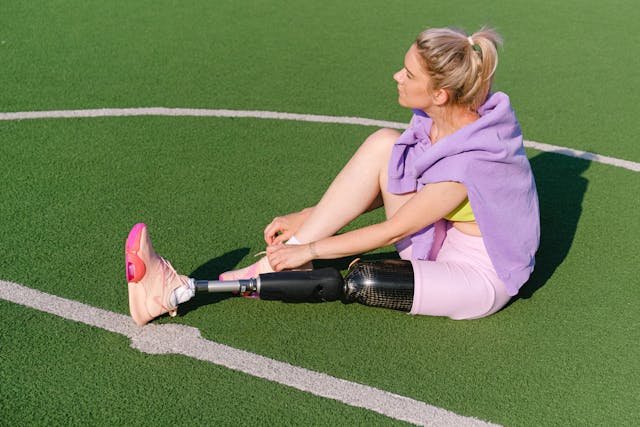
Children with lower-limb prosthetics can practice balance exercises that focus on weight shifting, stability, and leg control. Some helpful exercises include:
- Single-Leg Stands: Holding onto a chair or wall for support, they practice standing on one leg at a time. This strengthens the muscles needed for walking with a prosthetic.
- Step-Ups: Stepping onto a low platform or a stair helps improve leg coordination and weight distribution.
- Heel-to-Toe Walks: Walking in a straight line with the heel touching the toe of the opposite foot enhances balance and control.
By practicing these exercises, children learn how to trust their prosthetic leg and move with greater ease.
Coordination Drills for Kids with Arm Prosthetics
For children with arm prosthetics, improving hand-eye coordination and grip strength is essential. Some simple activities include:
- Ball Toss and Catch: Playing catch with a lightweight ball helps improve reaction time and arm control.
- Stacking Cups or Blocks: Arranging objects improves precision, grip control, and hand coordination.
- Push-and-Pull Movements: Using a resistance band or soft toy to push and pull strengthens the arm muscles and improves prosthetic control.
These fun exercises help children develop fine motor skills and confidence while using their prosthetic hand or arm.
Building Leg Strength for Walking and Running
For children with leg prosthetics, walking requires strong hip, thigh, and calf muscles. Weakness in these muscles can lead to an uneven gait, difficulty standing for long periods, or frequent falls.
Strengthening the Leg Muscles for Stability
Strengthening the supporting muscles around the prosthetic limb helps improve endurance, reduce fatigue, and create a more natural walking pattern.
Leg Exercises for Better Mobility
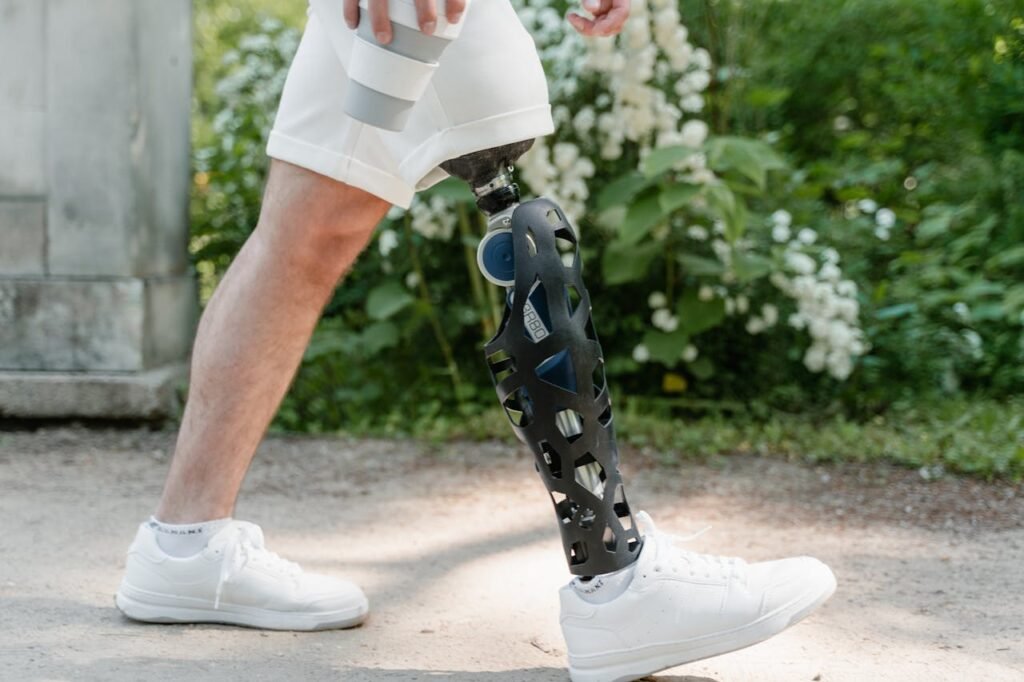
Some effective exercises for strengthening the legs include:
- Mini Squats: Holding onto a stable surface, bending the knees slightly, and standing back up strengthens the quadriceps and glutes.
- Leg Swings: Standing on one leg and gently swinging the prosthetic leg forward and backward improves range of motion and control.
- Seated Leg Lifts: Sitting on a chair and lifting the prosthetic leg up and down helps develop hip strength and endurance.
By practicing these movements, children can walk longer distances with less effort and greater confidence.
Running and Agility Drills
For children who want to run or play sports, additional training helps improve speed, coordination, and agility. Some fun drills include:
- Cone Weaving: Running or walking in a zig-zag pattern improves foot control and maneuverability.
- Short Sprints: Practicing short bursts of running helps develop power and confidence in movement.
- Jumping Exercises: Low-impact jumps onto a soft surface help strengthen leg muscles and improve reaction time.
These activities prepare children for more dynamic movements, allowing them to enjoy sports and physical activities with their peers.
Enhancing Grip Strength and Dexterity for Arm Prosthetics
Why Grip Strength Matters
For children with upper-limb prosthetics, developing hand strength and finger control is key to performing daily activities like holding utensils, writing, or playing with toys. Strengthening these muscles makes tasks easier, faster, and more comfortable.
Exercises to Strengthen the Hands and Fingers
Some simple but effective exercises to build grip strength include:
- Squeeze Balls: Using a soft stress ball helps improve finger and hand strength.
- Elastic Band Finger Stretches: Stretching fingers against a rubber band improves finger flexibility and coordination.
- Clay Molding or Playdough Squeezing: Playing with soft clay or putty strengthens the small muscles in the hand.
These exercises help children develop better control of their prosthetic hand, allowing them to grip objects securely and perform everyday tasks with ease.
Fun Activities for Fine Motor Skills
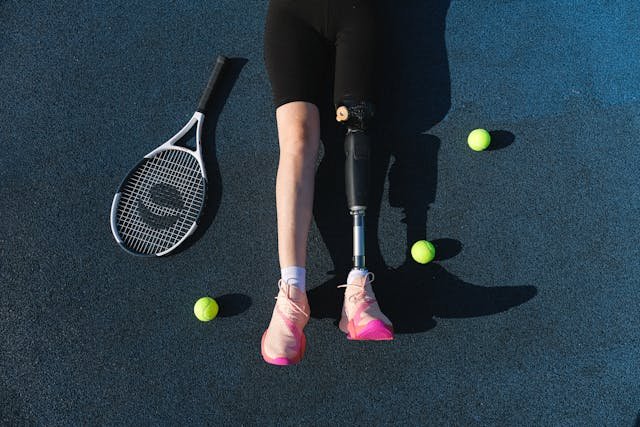
Fine motor skills are essential for writing, picking up small objects, and buttoning clothes. To make training fun, children can try:
- Threading Beads or Lacing Cards to improve finger precision.
- Coloring or Drawing to enhance wrist control and coordination.
- Using Tongs or Tweezers to pick up small objects, strengthening the pinch grip.
These activities train the brain and muscles to work together, making everyday hand movements feel natural and effortless.
Tracking Progress and Celebrating Milestones
Every child learns at their own pace, and setting small, realistic goals helps them stay motivated. Whether it’s taking the first independent step, gripping a cup more securely, or improving balance, each accomplishment should be recognized and celebrated.
Setting Small, Achievable Goals
For children with leg prosthetics, goals might include:
- Walking shorter distances without assistance before progressing to longer ones.
- Climbing a few stairs independently.
- Running a short sprint on a playground.
For children with arm prosthetics, goals might include:
- Picking up and holding a small toy with their prosthetic hand.
- Successfully using a spoon or fork during meals.
- Writing their name or drawing a simple shape.
Keeping track of these small victories builds confidence and a sense of progress, making training more enjoyable.
Using Fun Progress-Tracking Methods
To make tracking progress engaging, parents and therapists can use:
- Sticker charts where children earn stickers for completing exercises.
- Video recordings to visually compare improvements over time.
- A “Strength Journal” where kids note what they accomplished each day.
This approach turns prosthetic training into a rewarding experience rather than a routine task.
Encouraging Self-Motivation and Independence
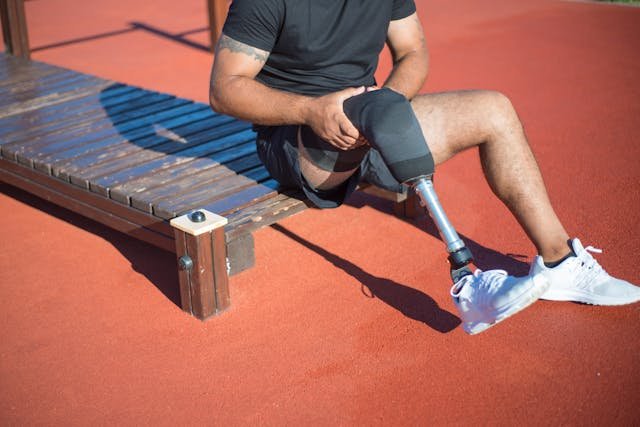
As children grow, they should be encouraged to take more responsibility for their own prosthetic training. This could mean:
- Choosing which exercises they enjoy the most.
- Setting their own daily or weekly movement goals.
- Finding creative ways to integrate exercises into their hobbies.
When children feel like they are in control of their progress, they are more likely to stay motivated and continue practicing their mobility skills.
Overcoming Common Challenges in Prosthetic Training
Children using prosthetic limbs may experience muscle fatigue, discomfort, or soreness if they overdo certain exercises. Since prosthetic limbs require different muscle engagement, some children may feel more tired than usual.
Managing Fatigue and Avoiding Overexertion
To prevent burnout:
- Encourage shorter, frequent training sessions rather than long workouts.
- Allow plenty of rest breaks between exercises.
- Teach children to listen to their bodies and stop if they feel pain.
A gradual approach ensures that their muscles adapt safely, preventing strain or discomfort.
Addressing Frustration and Emotional Barriers
Learning to use a prosthetic limb can be frustrating at times, especially when children compare themselves to their peers. They may feel self-conscious, discouraged, or impatient when certain movements don’t come easily.
To help with emotional barriers:
- Remind children that progress takes time and everyone learns at their own pace.
- Use positive reinforcement by celebrating every step forward.
- Share stories of other kids with prosthetics who have achieved great things.
Parents and caregivers should create a safe space for children to express their feelings and reassure them that setbacks are normal.
Adapting Exercises for Different Comfort Levels
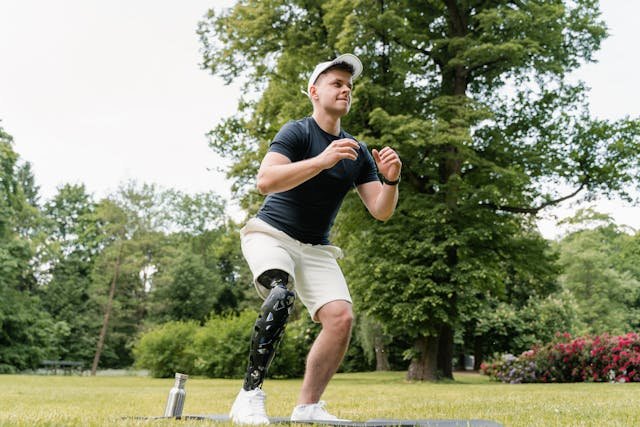
Every child’s comfort level with their prosthetic limb is different. Some may need extra time adjusting to new movements, while others may prefer alternative ways of training.
If a particular exercise feels too difficult, it can be modified. For example:
- If a child struggles with single-leg balance, they can practice leaning on a wall or using a balance bar first.
- If grip strength is weak, they can start with larger, easier-to-hold objects before progressing to finer motor tasks.
The key is to stay flexible and ensure that training is always a positive experience rather than a stressful one.
Integrating Prosthetic Training Into Daily Life
Making Movement a Natural Part of Everyday Activities
Instead of limiting prosthetic training to structured exercise sessions, children should be encouraged to use their prosthetic limbs throughout the day. Everyday tasks provide great opportunities for strengthening muscles and improving mobility.
For leg prosthetic users, activities like:
- Walking to and from school or around the house.
- Playing outdoor games like tag, hopscotch, or jumping rope.
- Practicing stepping up and down small curbs to improve agility.
For arm prosthetic users, activities like:
- Using their prosthetic limb to open doors or hold books.
- Playing with building blocks or puzzles to improve dexterity.
- Trying simple kitchen tasks like stirring or holding a plate.
The more children use their prosthetic limb naturally, the more comfortable and confident they will become.
Encouraging Play-Based Strength Training
Play is one of the best ways to help children stay active while strengthening their bodies. Instead of traditional exercises, parents can encourage:
- Obstacle courses that involve climbing, balancing, or crawling.
- Dance games or yoga poses that improve flexibility and coordination.
- Sports like soccer, basketball, or cycling that keep kids engaged and moving.
Turning training into a game makes exercise feel less like a chore and more like an adventure.
Creating a Supportive and Encouraging Environment
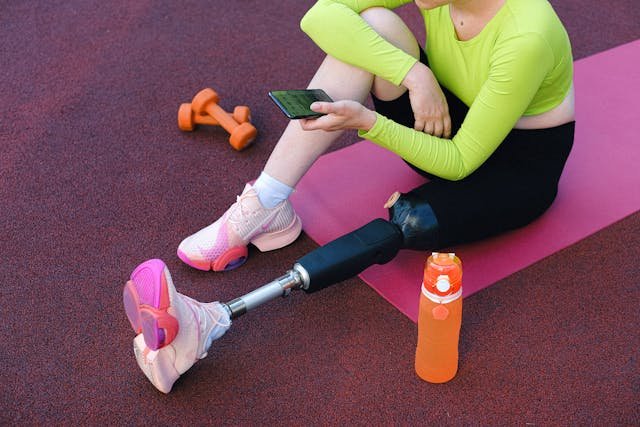
A positive support system makes all the difference in a child’s prosthetic journey. Encouragement from parents, siblings, teachers, and friends helps children feel motivated and capable.
Ways to create a supportive environment include:
- Praising effort rather than perfection to build confidence.
- Involving the whole family in active play so that training feels inclusive.
- Encouraging social interactions with other kids who use prosthetics to share experiences.
Children thrive when they feel supported and empowered, so creating a loving and motivating atmosphere is essential.
Looking Ahead: The Future of Prosthetic Mobility for Kids
The Role of Technology in Improving Prosthetic Functionality
Advancements in prosthetic technology are making movement easier, more natural, and more efficient. Some innovations that will enhance prosthetic mobility training in the future include:
- Myoelectric prosthetics that respond to muscle signals for smoother movement.
- Lightweight, more flexible materials that make prosthetic limbs feel natural.
- Smart prosthetics with AI sensors that adapt to a child’s movement style.
As technology continues to evolve, children will have even more opportunities to explore movement, play sports, and participate fully in daily activities.
Adaptive Sports and Competitive Opportunities
Many children with prosthetic limbs grow up to compete in sports at a high level. From running events to swimming competitions, adaptive sports provide exciting opportunities to test their strength and abilities.
Getting involved in local adaptive sports programs can:
- Help children stay active and fit.
- Build social skills and friendships with other kids.
- Boost self-confidence and motivation.
Whether playing for fun or competing seriously, sports are a fantastic way for children to improve their mobility and strength.
Conclusion : Lifelong Benefits of Prosthetic Training
Prosthetic training doesn’t just improve mobility and strength—it builds independence, resilience, and self-belief. The skills learned in childhood help children grow into confident, active adults who embrace life without limits.
By making prosthetic training fun, engaging, and part of everyday life, families can ensure that their child:
- Moves freely and comfortably.
- Feels proud and confident in their abilities.
- Enjoys an active and fulfilling future.
At Robobionics, we are committed to helping children move with confidence. If your child needs a custom prosthetic limb designed for strength, comfort, and active living, contact us today to find the best solution for their needs.



